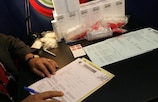New WADA prohibited list for 2016
Friday, January 1, 2016
Article summary
The World Anti-Doping Agency (WADA) has issued a new list of prohibited substances and methods, which come into effect on 1 January 2016.
Article top media content

Article body
The World Anti-Doping Agency has issued a new list of prohibited substances and methods, which will come into effect on 1 January 2016.
The Prohibited List – which can be found in the supporting documentation on the right of the page – specifies substances and methods prohibited in sport. Implementation of the list is mandatory for organisations that have adopted the World Anti-Doping Code.
The 2016 list contains a few changes compared to the 2015 list. These are:
• In category "S2. Peptide hormones, Growth Factors, Related Substances and Mimetics", leuprorelin has replaced triptorelin as a more universal example of a chorionic gonadotrophin and luteinizing hormone-releasing factor.
• In category "S4. Hormone and Metabolic Modulators", insulin-mimetics have been added to the list to include all insulin-receptor agonists. In addition, meldonium (Mildronate) has been added because of evidence of its use by athletes with the intention of enhancing performance.
• In category "S5. Diuretics and Masking Agents", it has been clarified that the ophthalmic use of carbonic anhydrase inhibitors is permitted.
• In category "S6. Stimulants", it has been clarified that clonidine is permitted.
Intravenous infusions and injections
UEFA would like to remind stakeholders of the status of intravenous (IV) infusions. According to the 2016 WADA Prohibited List (category "M2. Chemical and Physical Manipulation"), all IV infusions and/or injections of more than 50mL per 6-hour period are prohibited both in-and out-of-competition, except for those legitimately received in the course of hospital admissions, surgical procedures or clinical investigations or where a player has been granted a Therapeutic Use Exemption (TUE).
IV infusions have been included on the Prohibited List because they can be used to increase plasma volume levels, mask the use of a prohibited substance, and distort the values in the Athlete Biological Passport.
There have been reports in various sports of IV infusions, including dietary supplement and vitamin cocktails, being provided to athletes for recuperation or recovery. This practice is prohibited at all times without prior TUE approval. Further, it must be understood that the use of IV fluid replacement following exercise in order to correct mild to moderate dehydration is not clinically indicated nor substantiated by the medical literature. There is a well-established body of scientific evidence to confirm that oral rehydration is the preferred therapeutic choice.
Anyone administering an IV infusion which cannot be medically justified is committing an anti-doping rule violation (ADRV), whether or not the individual substance is prohibited. In such cases, both the player and the personnel administering the IV infusion may be sanctioned.
Further information
The circular letter sent in December 2015 to all national associations and to clubs currently participating in UEFA competitions gives more details on the 2016 Prohibited List, IV infusions, as well as on UEFA’s Therapeutic Use Exemption (TUE) procedures. This letter can also be found in the supporting documentation section on this page.
